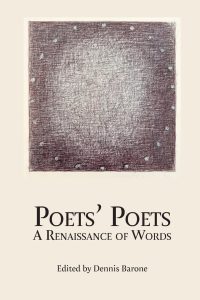Spuyten Duyvil
Review by David Starkey

“You are not for all markets,” Rosalind reminds the shepherdess Phoebe in As You Like It, and Dennis Barone, the editor of Poets’ Poets: A Renaissance of Words would surely sympathize with that sentiment. His is a collection of essays by mostly little-known living poets musing on the poetry of (mostly) deceased poets whose work has been largely forgotten. It’s the sort of a premise only a fellow minor poet is likely to embrace, and I must admit, I fell for it—hard.
Indeed, I was barely halfway through the book before I had ordered copies of books by two poets I’d never heard of: Bert Myers (1928-1979) and the unfortunately named Frederick Mortimer Clapp (1879-1969). Neither’s work disappointed, which supports the explicit and implicit argument of Poets’ Poets: readers of poetry need to step up and actually buy the work of poets they admire.
That’s hard, of course, when there are so many capable poets writing at this very moment—thousands and thousands, many of whom have published full-length collections. Nevertheless, Poets’ Poets makes a strong case for the idea that you can never have too much poetry in your life, despite the fact that, as Barone puts it, “it can feel like interest in literature is on its last wobbling legs.”
Which is not to say that the plan of the book is in any way programmatic. In fact, the authors of the brief biographies frequently initially read the work of their poets by accident. Julia Enzer, for instance, writes of Marcia Nardi (1901-1990), “I first encountered [her] in a footnote.” “Truth be told,” Ciaran Berry writes of Hyam Plutzik (1911-1962), “I probably wouldn’t have come across his work if I didn’t teach at Trinity College, in Hartford, Connecticut, Plutzik’s alma mater.”
Often the authors are astonished that the poets they are introducing have been so thoroughly disremembered. Resurrecting the work of Harry Crosby (1898-1929), Gian Lombardo laments: “A glance at the index of Hugh Kenner’s The Pound Era—a primer of sorts on that movement—shows no mention of [Crosby], which is inexplicable.” At other times, the authors acknowledge their poet’s obscurity with a shrug. Johanna Drucker asks, “Who was William Greenwood, author of Into the Center of America? I can find no trace of him after fifty years.” (She should have checked ChatGPT: apparently Greenwood is still alive and writing poetry.)
Sometimes the poets’ biographies sound as if they come from a work of fiction. According to Patrick James Dunagan, Richard Tagett (1936-2024) “was born…onsite at corner pump station in Ashtabula, Ohio.” Joel Lewis informs us that Walter Lowenfels (1897-1976) was born “to a wealthy German Jewish family who owned Hotel Bar Butter—a well-known New York City brand that still exists today.” And then there’s Baroness Elsa von Freytag-Loringhoven (1874-1927). In the words of Abigail Child: “Born in Germany with a sensitive, cultured mother who ultimately withdraws into madness and dies in a sanatorium of uterine cancer, and a father who is a virile, ‘violent-tempered’ bullying patriarch, Elsa heads to Berlin where she is eventually thrown out of her aunt’s home and taken up by artists.” With a background like that, the poetry practically writes itself.
Some of the poets died relatively early, which may partly account for their obscurity, but many lived long lives. Often, perhaps because of a lack of renown, they simply stopped writing. Martha Collins tells us that Catherine Breese Davis (1924-2002) “didn’t finish any new work for seventeen years.” Richard Kostelanetz notes that after writing two remarkable books, N.H. Pritchard (1939-1996) “changed his name…and moved to Gradyville, Pennsylvania, west of Philadelphia, where he died two dozen years after his father. If a cache of unpublished poems exists, they haven’t surfaced.”
Not all of the poet are obscure. The work of Leslie Scalapino (1944-2010) and Bernadette Mayer (1945-2022) is still very much present in contemporary avant-garde discussions, and movie star-handsome Frank Stanford (1948-1978) has had something of a personal renaissance lately. Interestingly, it is Stanford who inspires the best essay in the book, by Timothy Liu, one of the most renowned contributors. Liu’s essay not only provides a strong overview of Stanford’s poetry, it also stands as an exemplary piece of creative nonfiction. Liu summarizes the challenges of his subject as follows: “Chinaman. Injuns. The plural N-word. Does diction alone cancel genius in 2023? This by a man who shot himself three time through the heart on his way out. Triggering indeed.”
“A poet,” Baron Wormser writes in the penultimate essay, on Joe Bolton (1961-1990), “is someone who asks the perennial question ‘What is that?’” These brief appreciations go “the perennial question” one better and ask, “Who is it who wrote those marvelous, neglected poems?” The answers vary tremendously, but the lives of the poets presented here are always fascinating.
On second thought, maybe Poets’ Poets is, if not “for all markets,” at least for those markets where, as Barone would have it, people “stand behind the cry long live literature [and] are doing all they can to preserve and promote it.”
